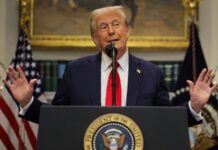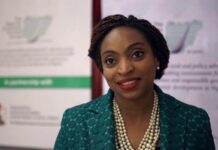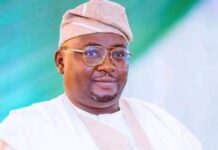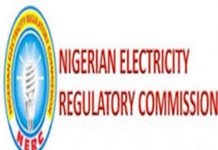As President Muhammadu Buhari clocks six years in office today, his spokesman, Mr. Femi Adesina has banged the drum for the administration.
In a lengthy statement captioned ‘The Buhari administration at 6: Counting the blessings one by one’ Adesina said “from infrastructure, to finance, education, healthcare, sports, anti-corruption, human development , housing, oil and gas, foreign relations, and many others, the Administration is recording giant strides, enough to make Nigerians proud.”
He said the sixth year celebration “affords the opportunity to reflect, and recount the impact that has been made (and is being made) on different sectors of national life.
“Some people claim: we don’t see what they are doing. We don’t hear about it. Well, here it is. A Fact Sheet, a report card on the Buhari Administration, just a bit of the successes, as the milestone of six years is attained.
As it is said, the past is but a story told. The future may yet be written in gold. When the Administration breasts the tape in another two years, by the grace of God, the applause will be resounding, even from the worst of sceptics. Facts are undeniable, and always remain so.”
Infrastructure
On infrastructure, Adesina said Adesina listed the achievements to include
-Presidential approval, in 2020, for the establishment of InfraCo Plc, a world class infrastructure development vehicle, wholly focused on Nigeria, with combined debt and equity take-off capital of N15 trillion, and managed by an independent infrastructure fund manager.
– Establishment in 2020 of the Presidential Infrastructure Development Fund (PIDF), with more than $1 Billion in funding so far.
– The Nigerian Sovereign Investment Authority (NSIA) has seen total additional inflows from the Government of around US$2 billion under the Buhari Administration – since the original US$1 billion which the Fund kicked off with in 2012.
– Launch of the Nigeria Innovation Fund, by the NSIA, to address investment opportunities in the domestic technology sector: data networking, datacenters, software, Agri-tech, Bio-tech, etc.
Rail
– 156km Lagos-Ibadan Standard Gauge Rail nearing completion
– 327km Itakpe-Warri Standard Gauge Rail completed and commissioned 33 years after construction began.
– Abuja Light Rail completed in 2018.
– Ground-breaking done for construction of Kano-Maradi Standard Gauge Rail, and revamp of Port-Harcourt-Maiduguri Narrow Gauge Rail.
– Financing negotiations ongoing for Ibadan-Kano Standard Gauge Rail project
Roads
– Presidential Infrastructure Development Fund (PIDF), investing over a billion dollars in three flagship projects: Lagos-Ibadan Expressway, Second Niger Bridge, Abuja-Kaduna-Zaria-Kano Expressway.
– Executive Order 7 mobilizing private investment into the development of key roads and bridges like Bodo-Bonny in Rivers and Apapa-Oshodi-Oworonshoki-Ojota in Lagos
– Highway Development and Management Initiative (HDMI), a public-private partnership program to mobilise, in its first Phase, over a Trillion Naira in private investment into the development and maintenance of 12 Roads, amounting to 1,963km in length.
– More than 360 billion Naira worth of Sukuk Bonds raised since 2017 for dozens of critical road projects across all six geopolitical zones.
Ports
– Completion of New Terminals for International Airports in Lagos, Abuja, Kano and Port Harcourt
– Construction of New Runway for Abuja and Enugu International Airports
– Presidential approval for four International Airports as Special Economic Zones: Lagos, Kano, Abuja and Port Harcourt.
– Approval for new private-sector funded deep sea ports: Lekki Deep Sea Port (Construction already well underway, for completion in 2022); Bonny Deep Sea Port (Ground-breaking done in March 2021); Ibom Deep Sea Port; and Warri Deep Sea Port
– Development of capacity at the Eastern Ports:
*In December 2017, Calabar Port commenced export of bulk cement to Tema Port in Ghana
*In 2019, three container ships berthed at Calabar Port, for the first time in eleven years
*Dredging of Warri Port (Escravos Bar—Warri Port channel) completed in 2018
*On October 30, 2019, an LPG Tanker operated by NLNG, berthed in Port Harcourt – the first time ever an LPG ship berthed in any of the Eastern Ports
*On December 8, 2019, Onne Port received JPO VOLANS (owned by Maersk), the FIRST gearless and largest container vessel (265.07 metres) to call at any Eastern Port in Nigeria.
*On August 1, 2019, Onne Port’s Brawal Terminal received MSC GRACE, its first container vessel since 2012.
Power
Energizing Education Programme: Taking clean and reliable energy (Solar and Gas) to Federal Universities and Teaching Hospitals across the country. Four Universities completed and commissioned already: BUK (Kano), FUNAI (Ebonyi), ATBU (Bauchi) and FUPRE (Delta); others ongoing.
Energizing Economies Programme: Taking clean and reliable energy (Solar and Gas) to markets across the country. Completed projects include Sabon-Gari Market in Kano, Ariaria Market in Aba, and Sura Shopping Complex in Lagos.
National Mass Metering Programme: Nationwide rollout of electricity meters to all on-grid consumers, launched in August 2020. The Central Bank of Nigeria is providing 60 billion Naira for the first phase, with a target of 1 million meter installations. So far more than 500,000 meters have been delivered to the Discos, and more than 280,000 installed.
Solar Power Naija: Launched in April 2021 to deliver 5 million off-grid solar connections to Nigerian households. The program is expected to generate an additional N7 billion increase in tax revenues per annum and $10 million in annual import substitution. In May 2021, the Rural Electrification Agency announced the planned deployment of solar-powered grids to 200 Primary Health Centres (PHC) and 104 Unity Schools nationwide.
Presidential Power Initiative (PPI), aka Siemens Power Program: A Government-to-Government initiative involving the Governments of Nigeria and Germany, and Siemens AG of Germany, to upgrade and modernize Nigeria’s electricity grid. Contract for the pre-engineering phase of the Presidential Power Initiative (PPI) was signed in February 2021, following the 2020 approval for the payment of FGN’s counterpart funding for that phase.
Nigeria Electrification Project (NEP) has provided grants for the deployment of 200,000 Solar Home Systems, impacting one million Nigerians. The NEP is also delivering mini-grids across the country.
Housing
– The Family Homes Fund Limited (FHFL), incorporated by the Federal Government of Nigeria in September 2016, is the implementing agency for the Buhari Administration’s National Social Housing scheme.
– More than two thousand (2,000) hectares of land with titled documents have been given by 24 States for the Buhari administration’s Social Housing programme, with the capacity to accommodate about 65,000 new homes.
– Under the National Social Housing programme, Nigerians will be given at least a 15-year period with a monthly payment at 6 percent interest rate, to pay for each housing unit. The Central Bank of Nigeria is providing a N200 Billion financing facility, with a guarantee by the FGN.
As the President Muhammadu Buhari-led administration clocks six years today, the Presidency has reeled out major achievements of the regime, with a prediction that even known critics of the President would give a resounding applause to the administration when it finally ends on May 29, 2023.
A statement titled: “The Buhari Administration At Six: Counting The Blessings One By One”, issued yesterday by the Media Adviser to the President, Mr. Femi Adesina, captured the President’s score card under 26 subheads, including extension of over N2 trillion to the 36 states as bail out to pay workers’ salaries and issuance of nine executive orders, as well as assenting to 14 legislative bills.
The Presidency stressed that the six years of Buhari’s administration afforded it an opportunity to reflect, and recount the impact that had been made, “and is being made on different sectors of national life.”
According to the Presidency, the administration is recording giant strides, from infrastructure, to finance, education, healthcare, sports, anti-corruption moves, human development, housing, oil and gas, foreign relations, and many others, enough to make Nigerians proud, “that is, those who are dispassionate and fair-minded, not beclouded by political partisanship and undue cynicism.”
The sector by sector breakdown of the achievements of President Buhari from 2015 to 2021, as listed by the Presidency, showed that under infrastructure category, came the Presidential approval, in 2020, for the establishment of InfraCo Plc, a world class infrastructure development vehicle, wholly focused on Nigeria, with combined debt and equity take-off capital of N15 trillion, and managed by an independent infrastructure fund manager.
Other efforts under this category include the establishment in 2020 of the Presidential Infrastructure Development Fund (PIDF), with more than $1 billion in funding so far.
On investment committed to rail transportation in the country, the statement listed the 156km Lagos-Ibadan Standard Gauge Rail nearing completion; the 327km Itakpe-Warri Standard Gauge Rail which was completed and commissioned 33 years after construction began.
Others are the Abuja Light Rail, which was completed in 2018; the ground-breaking for construction of Kano-Maradi Standard Gauge Rail, and revamp of Port-Harcourt-Maiduguri Narrow Gauge Rail.
It also listed ongoing financing negotiations for Ibadan-Kano Standard Gauge Rail project.
On road projects, the statement listed the PIDF, the investment of over a billion dollars on three flagship projects: Lagos-Ibadan expressway, Second Niger Bridge and Abuja-Kaduna-Zaria-Kano expressway.
Other efforts in this regards included the Executive Order 7 to mobilise private investment into the development of key roads and bridges like Bodo-Bonny in Rivers and Apapa-Oshodi-Oworonshoki-Ojota in Lagos.
The Buhari administration, according to the statement, has done well in boosting the capacity of the nation’s ports.
Adesina cited such efforts as the completion of new terminals for International Airports in Lagos, Abuja, Kano and Port Harcourt; Construction of New Runway for Abuja and Enugu International Airports and the Presidential approval for four International Airports at Special Economic Zones: Lagos, Kano, Abuja and Port Harcourt.
Others include, the approval for new private-sector funded deep sea ports: Lekki Deep Sea Port (construction already well underway, for completion in 2022); Bonny Deep Sea Port (ground-breaking done in March 2021); Ibom Deep Sea Port; and Warri Deep Sea Port. The list includes the development of capacity at the Eastern Ports.
In the power sector, Adesina listed President Buhari’s effort to include the implementation of Energising Education Programme, which involves taking clean and reliable energy (Solar and Gas) to Federal Universities and Teaching Hospitals across the country. Projects in four Universities have been completed and commissioned: BUK (Kano), FUNAI (Ebonyi), ATBU (Bauchi) and FUPRE (Delta). Others are ongoing.
He listed another achievement to include the National Mass Metering Programme, which involves the nationwide rollout of electricity meters to all on-grid consumers, launched in August 2020.
Listed as achievements were the ground-breaking on 614km Ajaokuta-Kaduna-Kano Gas Project, successful completion of Nigeria’s first Marginal Field Bid Round in almost 20 years, expected to raise in excess of half a billion dollars.
The achievements also included the Policy, Regulatory and Funding Support for the establishment of Modular Refineries across the Niger Delta.
On agriculture, the administration maintained that the Anchor Borrowers Programme (ABP) of the Central Bank of Nigeria, launched by President Muhammadu Buhari on November 17, 2015, has made more than N300 billion loans to more than 3.1 million smallholder farmers of 21 different commodities (including Rice, Wheat, Maize, Cotton, Cassava, Poultry, Soya Beans, Groundnut, Fish), cultivating over 3.8 million hectares of farmland.
It noted that the Presidential Advisory Committee Against Corruption (PACAC) has helped anti-corruption agencies devise clearer strategies for obtaining forfeiture of assets suspected to have been acquired fraudulently, mainly from State coffers, before prosecuting suspected culprits.
The Presidency noted that the administration had been able to secure billions of dollars in concessional infrastructure funding for critical road and rail projects. It noted, for instance, that President Buhari’s April 2016 official visit to China has unlocked billions of dollars in infrastructure funding, primarily for road, rail and port projects, as well as the implementation of a Chinese Yuan (CNY) 15 billion Currency Swap Agreement between the Peoples Bank of China and the Central Bank of Nigeria.
It noted that the administration had been able to secure international recognition within the period of six years and this include the designation of President Buhari as the African Union (AU) Anti-Corruption Champion for 2018, and by ECOWAS Heads of State as West Africa’s COVID-19 Champion in 2020.
It also listed the appointments of eminent Nigerians into international posts. These include, Amina Mohammed, Deputy Secretary-General of the United Nations (UN), appointed 2017;’ Ngozi Okonjo-Iweala, Director General of the World Trade Organization (WTO) (first African and first woman to hold the position, elected 2021; Akin Adesina, President of the African Development Bank, elected in 2015 and re-elected 2020;; Benedict Oramah, President of African Export-Import Bank (Afreximbank), re-elected for a second term in 2020; and – Mohammad Sanusi Barkindo, Secretary-General of the Organisation of Petroleum Exporting Countries (OPEC); elected 2016, re-elected 2019, among others.
Meanwhile, the Peoples Democratic Party (PDP) has cautioned President Buhari to use the May 29 speech to accept his lapses in his administration and avoid exasperating Nigerians with his usual prepared text of false performance-claims and empty promises.
In a statement by the PDP National Publicity Secretary, Kola Ologbondiyan, the party said the President and the All Progressives Congress (APC) “must know that Nigerians are no longer interested in their stage-managed Presidential addresses, as well as the circus show of their so-called APC Legacy Awareness Campaign, particularly in the face of the horrendous situation they have plunged the nation.”




























































